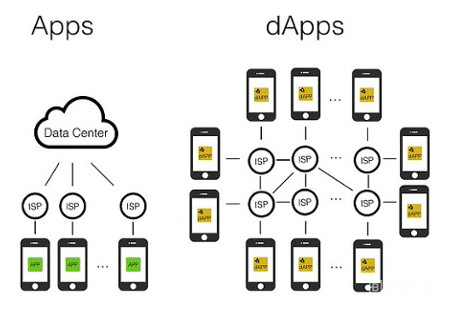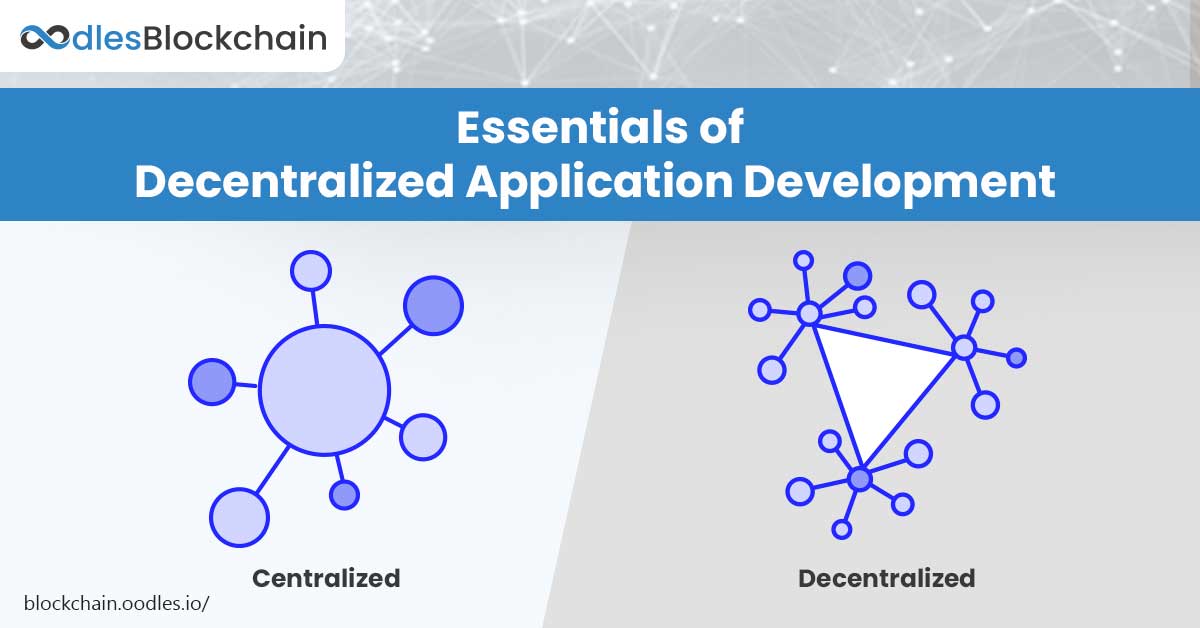-
Amid a global crisis like COVID-19, industry experts believe that the cryptocurrency and blockchain development space will gain significant traction. Both concepts have changed the way we see financial transactions and do business. In the last decade, they have given birth to a range of new buzzwords. One of the buzzwords popular among the blockchain community that we will explore in this guide is decentralized application development (dApp). For the uninitiated, the guide will serve as a coherent article explaining the importance of dApp development and its workings.
Decentralized Applications | Decoding Decentralization
Decentralized means that no central authority controls owns, or manages an application. However, decentralization not only empowers digital currencies but also can be applied to diverse business applications.
Let’s understand the concept of decentralization with a simple example. When you use fiat money to buy anything, essentially you contribute to a centralized system. It is because a buyer or seller does not control the flow of fiat currency. That role is reserved for the central bank of your country. Put simply, centralized systems are prone to inefficiencies, complexity, errors, and hacks.
Digital money like Ether, XLM, etc. challenges the idea of centralization by providing a decentralized currency system. Being decentralized means that no centralized bank or government can control the use of currency. Instead, it is the users that have control over their digital money with a decentralized system. Now, read on to understand the role of blockchain smart contract solutions in dApp development.
You may also like to explore| A Guide for Businesses to Develop a Decentralized App (DApp)
Decentralized Applications | Smart Contract Solutions
It was Ethereum that introduced the smart contract technology in 2015. It enables possibilities for not only for financial transactions but also for business applications. Essentially, a smart contract is a decentralized digital contract that enables two or more people to agree as per specified transaction or business terms. When the involved parties in a contract fulfill the mentioned conditions, a smart contract executes its operations automatically.
Understanding the Workings of Decentralized Applications with a Real-World Example
For instance, Alice wants to sell a house. She pays for broken and application fees. However, with a smart contract, she put conditions to sell her house into a smart contract ( with a token representing the ownership of the house). She set the price at 100 ETH. Now, the condition of that smart contract is that IF someone sends 100 ETH to it THEN the token will be delivered to that person’s address. If a buyer wants to buy a house, they only need to transfer the right amount of ETH to a smart contract. In case, if it is not the right amount, then the smart contract will return the amount ETH to the sender.
With smart contract solutions, she does not need a broker. She does not need to pay any application fees either.
A smart contract involves no central authority to trust, and thereby, no commission is required. There are numerous applications of smart contracts such as booking hotels/flights, car selling and buying, lending money, and many more. The main advantage of smart contract technology is that it removes the need for a third party to verify an agreement as they run on a decentralized system (the blockchain). Another benefit is that when we deploy a smart contract onto the blockchain, nobody can amend or change the contract terms and making it impossible to reverse. It means no one can tamper with smart contracts. For a more detailed explanation of how smart contract technology works, visit this page.
Decentralized Applications | An Edge Over Centralized Apps
Before we get into the technology of dApps or decentralized applications, first understand the history of regular (centralized) apps and how they function. We’ll then explain why making these apps decentralized is so important.
Must-Read | Why Develop a DApp | Is It Better Than A Traditional Web or Mobile App
Centralized and Decentralized Applications
Centralized apps are quite opposite of decentralized applications. For instance, Facebook, the social media giant, has more than 2 billion users around the world. Now, imagine the amount of private information we send to Facebook. If we multiply that information by 2 billion users, the Facebook team will have a very large database of private information, all held privately on their centralized servers. Even if you trust Facebook that it won’t abuse the information, it often offers that to marketing companies. Centralized servers can also shut down anytime.
Introducing Decentralization
However, if Facebook uses decentralized servers instead, it will be operating as a decentralized application. It means that even if one system shuts down, the network will continue to operate as the information is shared across numerous different nodes and not just in one centralized point. Additionally, Facebook operating with decentralized servers will also mean that information is stored on a shared database. Thus, nobody has control over it. Further, encryption mechanisms safeguard information and enable only one person with the power to decrypt it. In other words, every user will be able to control the flow of their personal information.
Decentralized applications serve as the interface for blockchain and smart contracts. So, we can say, the blockchain as the Internet, smart contracts as the World Wide Web, and dApps as Facebook and YouTube. Let’s understand this with a simple explanation. Decentralized applications enable the use of smart contracts and the blockchain in a user-friendly way. In the instance of selling a house with a smart contract, dApp will be the interface. Users will download it onto their smartphone or PC. Then, a seller will set a price for a house, input the details, upload photos, etc. Further, a buyer wanting to make a purchase can press “buy” on the dApp. Automatically, the dApp will transfer the ETH to the smart contract.
[caption id="attachment_7797" align="aligncenter" width="450"]
 source: newgenapps[/caption]
source: newgenapps[/caption]Decentralized App Development with Blockchain
A few popular blockchain platforms for dApp development are Ethereum, EOS, Corda, Credits, and more. However, Ethereum remains the frontrunner in dApp development due to its smart contract functionality and other blockchain characteristics.
Ethereum Blockchain dApp Development
Ethereum blockchain application development is most suitable for decentralized applications due to its provision for 'smart' smart contracts solutions. Computer-generated Ethereum smart contracts are business terms that operate without any censorship, downtime, fraud, or third-party intermediaries.
Ethereum’s native crypto coin is Ether. Users use ETH to pay for transactions and services on the dApp Ethereum network. Ethereum blockchain boasts of sharing more than 50 percent of the market share of dApps. Around thousands of dApp currently are active and in use for numerous applications like stock market predictions, digital signatures, gaming, social media, etc.
Conclusion
In this guide, we found that the trend of blockchain and dApp development, including both cryptocurrencies and non-crypto currencies, is gaining significant traction across industries. The number of dApp is increasing rapidly with the latest technological innovation in DLTs like Blockchain. The increased use of dApp is laying the foundation for stronger networks of blockchain over the internet. Although the count of dApps is still relatively low, it is growing faster each day. If you think you have a business idea and want to develop a dApp, connect with us for a detailed discussion. At Oodles, we provide decentralized app development with various blockchain platforms to meet specific business needs.

Our Offices
INDIA
Emaar Digital Greens, Sector 61,
Gurugram, Haryana
122011.
Welldone Tech Park,
Sector 48, Sohna road,
Gurugram, Haryana
122018.













